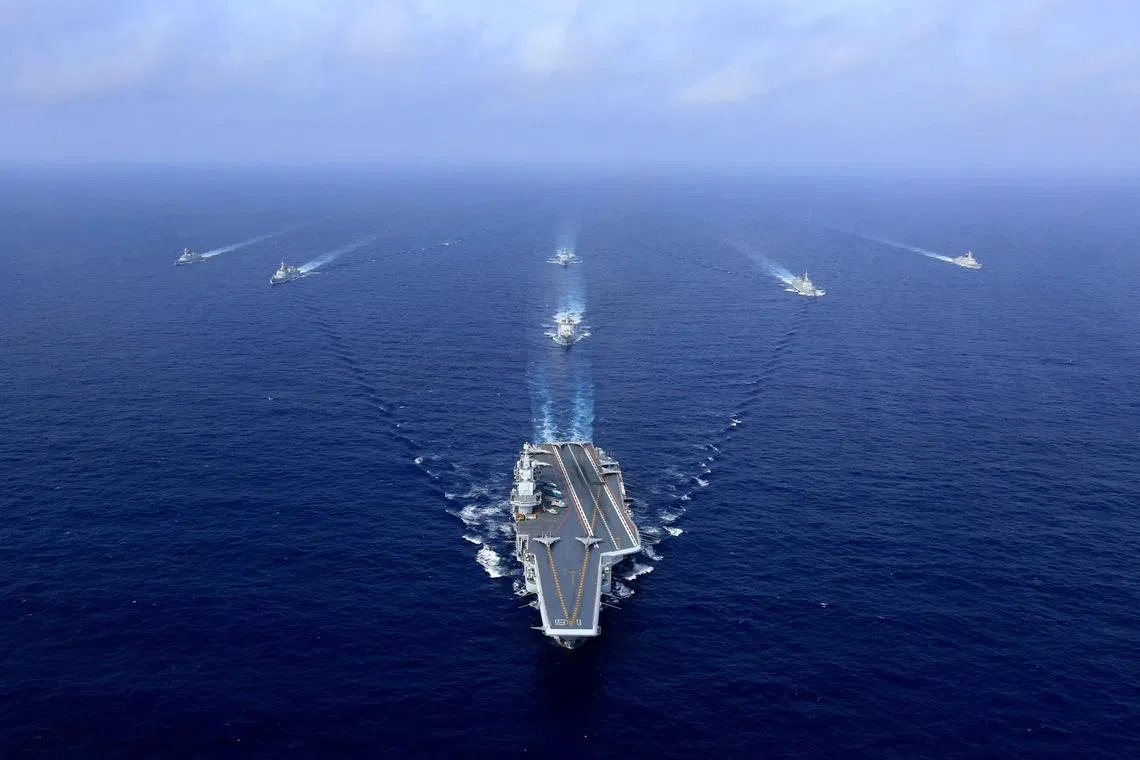Keep status quo on Taiwan, analysts urge, as scenarios exercise shows war with China would be catastrophic
Sign up now: Get ST's newsletters delivered to your inbox

The war would leave China’s navy in a shambles, and tens of thousands of Chinese soldiers prisoners of war, the scenarios showed.
PHOTO: AFP
Follow topic:
WASHINGTON – A full-scale war involving the United States and Japan in the defence of Taiwan against an invasion of the island by China would involve “massive attrition” on both sides, dwarfing the scale of the war in Ukraine,
The exercise, run 24 times by the Washington think-tank Centre for Strategic and International Studies (CSIS), is set in 2026.
All scenarios start with a lightning invasion of Taiwan by China, and the assumption that the island does not quickly give up.
In the ensuing war, as the US strikes the Chinese invasion force, and Japan is sucked into the vortex, both the US and Japan would “lose dozens of ships, hundreds of aircraft and thousands of service members”, the scenarios showed.
“Such losses would damage the US global position for many years,” a report said. “While Taiwan’s military is unbroken, it is severely degraded and left to defend a damaged economy on an island without electricity and basic services.”
The war would leave China’s navy in a shambles, and tens of thousands of Chinese soldiers prisoners of war. Casualty numbers would be on a scale not experienced by the US since World War II, Dr Matthew Cancian, a senior researcher at the US Naval War College, said at the release of the report in Washington on Monday.
The exercise found that Taiwan’s army would see 3,500 casualties and the bulk of its navy sunk. Japan would likely lose over 100 combat aircraft and 26 warships.
The exercise came with repeated caveats.
“Modelling an invasion does not imply that it is inevitable or even probable,” emphasised the report, which is titled The First Battle Of The Next War.
“The Chinese leadership might adopt a strategy of diplomatic isolation, grey zone pressure, or economic coercion against Taiwan; even if China opts for military force, this might take the form of a blockade rather than an outright invasion.”
But it added that “the risk of invasion is real enough and potentially so destructive that analysis is worthwhile”.
The project does not take a position on whether the benefits of defending Taiwan outweigh the prospective costs, or how to weigh those costs and benefits.
China regards Taiwan as a renegade province awaiting reunification with the mainland,
“I think we can all agree that a conflict with China would be a disaster,” Professor William Murray at the Naval War College said during the release of the report.
The report comes as US-China ties have plunged, with Taiwan emerging as a major red line for China, and as a litmus test of US resolve. China sees the US as eroding its stand on its “one-China” policy, which does not recognise Taiwan as an independent entity.
The US insists it is sticking to the policy. But a visit to Taiwan in August 2022 by then House Speaker Nancy Pelosi mounted large-scale military drills around Taiwan.
But after months of speculation, Chinese President Xi Jinping met his US counterpart Joe Biden in Bali in November, where the two leaders – at their first in-person meeting since Mr Biden took office in 2020 – agreed to restart normal diplomatic engagement.
US Secretary of State Antony Blinken is set to visit Beijing soon. State Department spokesman Ned Price last week said the focus of the visit would be on managing the Sino-US relationship responsibly to ensure “competition does not veer into conflict”.
But in Washington, the new House has convened with a Republican majority full of China hawks who want to push against Beijing – and find plenty of support from the Democrats. In the face of the bipartisan consensus, which has China being called an “enemy” and an “existential threat” by politicians and the Pentagon alike, Mr Biden is vulnerable to accusations of being too soft on China.
On Sunday, China sent 28 warplanes across the median line of the Taiwan Strait
On the Chinese side, the state-run China Military Online reportedly wrote in a statement: “The exercise focused on land strikes, sea assaults and other subjects, aiming to test the troops’ joint combat capability and resolutely counter the collusive and provocative acts of the external forces and the ‘Taiwan independence’ separatist forces.”
In the latest issue of Foreign Affairs magazine, Mr Jude Blanchette, Freeman Chair in China Studies at the CSIS, and Brookings Institution senior fellow Ryan Hass warned that while there are sound reasons for the US to focus on defending Taiwan, ultimately, Washington faces a strategic problem with a defence component, not a military problem with a military solution.
“The more the United States narrows its focus to military fixes, the greater the risk to its own interests, as well as to those of its allies and Taiwan itself,” the authors warned, explaining why “the best solution is no solution”.
“The sole metric on which US policy should be judged is whether it helps preserve peace and stability in the Taiwan Strait – not whether it solves the question of Taiwan once and for all or keeps Taiwan permanently in the United States’ camp,” they wrote.
“Once viewed this way, the real aim becomes clear: to convince leaders in Beijing and Taipei that time is on their side, forestalling conflict. Everything the United States does should be geared towards that goal.”
Separately, in an online discussion hosted by US think-tank Defence Priorities on Monday, Professor Kishore Mahbubani, veteran diplomat and founding dean of the Lee Kuan Yew School of Public Policy in Singapore, told The Straits Times: “There is a very easy way of avoiding war on Taiwan – just preserve the status quo; in all its respects, that is all you need to do.
“Because everyone knows how sensitive the Taiwan issue is; because if you push the Chinese on Taiwan, they have to react.”
Taiwan is the one issue over which the Chinese cannot react rationally, Prof Mahbubani said, adding: “Every Chinese agrees that, eventually, Taiwan should join China. Fine, let’s leave it at that.”


